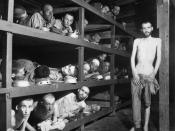Night Essay
During World War II, the prisoners in the numerous concentration camps scattered around Europe were put to the test not only physically, but also mentally. The SS troops, Germany's private police force and Hitler's bodyguards, administered the camps and made the "undesirables'" lives even more difficult. Captives, if I may call them that, were tortured and abused. Such treatment can lead to many problems with a person's health, the body and the mind. The concentration camps during the long years of Hitler's reign in Europe changed their inhabitants, like Elie Wiesel, author of the book Night , both mentally and physically.
You see children laughing and playing all the time, barely ever shy or kept to themselves. This, I believe, is because they are too young to have experienced anything to make them any different. Children are very outgoing and say what is on their mind.
They don't fear rejection, like the majority of us, and always know how to brighten somebody's day. They have such hope for the future and love for others that it's like they shine and stand out so much. Yet when a child experiences something life threatening, something so terrible that only a percentage of the population has witnessed it, such a thing will leave scars like the etchings on a tombstone. The child may become distant, far off in their own world, unaware of their surroundings. Wiesel was such a child. He not so much as became unaware, but he became distant. During the years he spent in the Nazi camps Auschwitz and Buchenwald, his mind began to change. His thoughts consisted of surviving for his father and how his God had abandoned him. He became quiet, shy, not talking to any but his father unless spoken to first.


